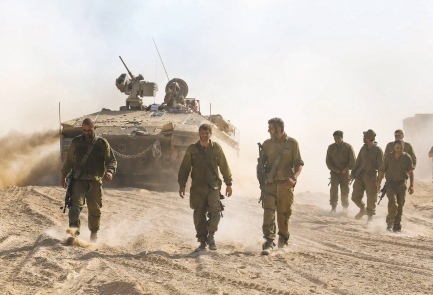
Israeli soldiers near the Gaza Strip border during Operation Protective Edge [archive]|Photo credit: Ziv Koren
IDF troops react to war crime accusations – This is my truth
“I was wounded because I was trained on IDF values to treat every injured person equally, even the wife of a high-level terrorist who faints in the middle of an arrest,” says one soldier left paralyzed when ambushed while providing medical care.
Following the release of the United Nations Human Rights Council report on Operation Protective Edge, several IDF soldiers provided personal testimony of their experiences on the frontline in a number of operations, demonstrating the Israeli military’s utmost priority of respecting human life and efforts to minimize harm.
A combat soldier in the Golani Brigade shared his testimony from 2014, when he treated a Syrian rebel in Israel’s north prior to Operation Protective Edge.
“My name is Gal Shmul and this is my truth,” he said. “I am a combat soldier and medic in Golani’s 13th battalion. About four months before Operation Protective Edge, we were on duty near Mount Hermon, and I found myself treating a Syrian rebel who was missing an arm. I managed to save his life. After treating him, the rebel told us that he would go to Jerusalem one day.”
Shmul went on to share his experience from last summer’s Gaza war: “During Operation Protective Edge, we were sent to Gaza. We were supposed to go in on a Friday, but they made us wait because they said there were still civilians in the area.
“After we received permission to enter, Hamas waited for us in Shujaiyya, using civilians as human shields and hiding in hospitals and kindergartens. About an hour after we went in, the terrorists were waiting for us in the tunnels, and that is because we sent warnings to the civilians to clear out — we lost our element of surprise. As a result, eight of my friends were killed, seven of them in the APC disaster,” he recalled.
Speaking about his own tragic experience in 2008, following a 2004 suicide bombing that killed 11 people in Jerusalem, Dror Dagan, a field medic in the elite Duvdevan unit, also shared his story: “Hamas in Bethlehem claimed responsibility for the attack. After a while, IDF intelligence closed in on the Hamas military commander in the city. The Duvdevan unit was dispatched on the mission, and after a day of reviewing battle procedure, we set out to capture the terrorist. It was a very complicated and dangerous mission due to field security reasons that I cannot expand on.
“When we burst into the [Hamas commander’s] house and started sweeping the rooms, a woman who we had identified as the commander’s wife fainted. As a medic, I didn’t hesitate, I rushed to treat her,” he recounted. “Within a couple of minutes, we realized the fainting was an act and that it was part of a trap. It was a trick, a way to buy time for the wanted terrorist to prepare. Suddenly, he burst in from behind a double wall and started shooting in every direction. Many soldiers were injured instantly, including myself.”
Dagan went on to speak about his injuries, saying. “One bullet went through part of my head and another was lodged in my spinal cord. After a long rehabilitation period, I am now still paralyzed from the chest down and I am considered 100% disabled.
“I was hurt because I was trained on IDF values to treat every injured person equally, even the wife of a high-level terrorist who faints in the middle of an arrest. And that really says it all. Our soldiers are injured when they behave more humanely and morally than any army in any war,” he said.
IDF District Coordination and Liaison Officer Elad Almog spoke about his experiences, which took place at the Erez Crossing to the Gaza Strip: “It was 2008. During the morning round on the base, there was suddenly a shower of mortar fire coming from the sky. We ran to the shelters at Olympic speed, and there I saw the other soldiers — some of them injured, others in shock. It was chaos.
“A young Palestinian boy came to the Palestinian side of the Erez Crossing, asking for medical care at an Israeli hospital. The crossing, which was under attack, had been closed to traffic,” he continued. “And there I was, in this sensitive situation, a young officer with the responsibility of dealing with a complicated civilian issue. I pushed for the crossing to be opened immediately to let the child through. Our forces were simply taught to respect all people and to treat uninvolved populations kindly.”
IDF intensive care medic Ofir Evron expanded on her experiences treating wounded Palestinians from 2012 to 2015. “In my service and in that of other medics, we were always prepared to be able to respond to a call within seven minutes, even if we were sleeping or in the shower — after all, it is our job to save lives,” she said.
“As IDF medics, we are committed to providing medical care to everyone, even if it means risking our own lives. At least once a week we encountered injured Palestinians waiting for treatment. Since we could not bring them inside the base, we went to them in an ambulance, and God knows what they could have been hiding under their clothing,” she said.
“During my service, I treated about 100 people. I can count the number of Israelis on one hand — the rest of the patients were Palestinian. I am proud to have served in the IDF and I am proud of my army,” she declared.
IDF troops react to war crime accusations – This is my truth







